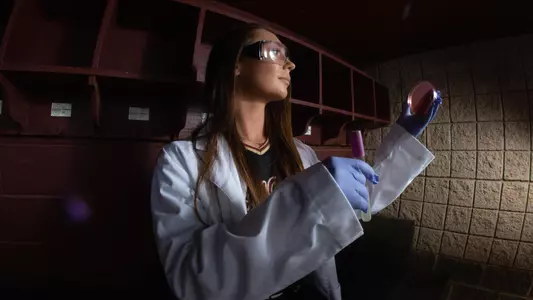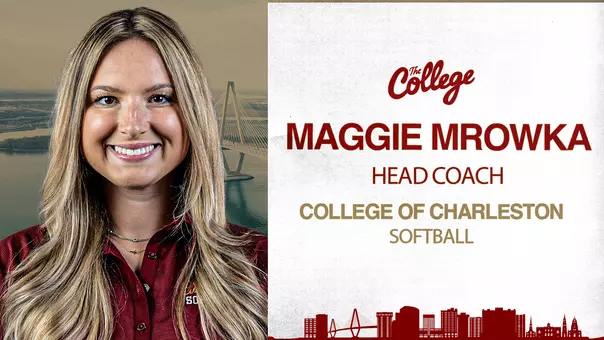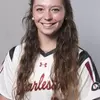
Burke Gains Insight Into Superbugs and Medical Rarities Through Summer Internship
10/14/2019 10:00:00 AM | Softball
Photo Credits: Marquise Pointer
MIKE HOFFMAN
CofCSports.com
Most people go to great lengths to avoid microorganisms that can cause great harm and even death. Junior Kylie Burke plans to make a career out of them.
A double major in biology and chemistry in the College of Charleston Honors College and a pitcher on the softball team, Burke spent last summer as an intern in the microbiology and infectious disease unit at Emory University Hospital in her native Atlanta.
Over the course of the summer, Burke had a hands-on learning experience that included work with some of the rarest and deadliest diseases on the planet, not only in the lab, but also directly with patients under the supervision of Dr. Colleen Kraft, a leading figure in the field.
For Burke, the internship continued a lifelong interest that was influenced by her father, Greg, a physicians' assistant (PA) at Emory.
"My dad took me to PA lectures and labs at an early age, so I've always had an inclination towards medicine," Burke said. "He exposed me to different aspects of the field and helped guide me in my class choices."
Ironically, of all the subspecialties her father has worked in, he was never involved with infectious diseases. It was Burke's insatiable curiosity about the field that ultimately put her on her career path.
"When I was in high school, I started Googling rare diseases that I'd hear about," she said. "I started learning about life cycles and how infectious diseases were spread. When this internship became available, I thought it was perfect for me."
As perfect as it may have been, Burke still faced long odds to secure the position. Even with a background that included four years working in a pediatrics office in high school and a rigorous college class schedule, Burke was up against competition from around the country, including students from Harvard and Stanford.
In the end, however, it was the combination of her academic prowess, previous clinical experience working with patients and class selections – including a genetics lab – that put her over the top. It marked a rare instance in which Emory accepted an undergraduate intern and the first time it did so in infectious diseases.
And there proved to be no better place for Burke to continue her education. Working at a teaching hospital gave her the opportunity to follow Dr. Kraft when she was seeing patients. Kraft made an immediate impression on Burke, for her medical skills and compassion.
 "Dr. Kraft is one of the best physicians in her field, but she still puts a lot of emphasis on helping those coming up behind her," Burke said. "She was very patient, even when something was difficult for me to grasp. Not many people would have made such a time commitment as she did this summer.
"Dr. Kraft is one of the best physicians in her field, but she still puts a lot of emphasis on helping those coming up behind her," Burke said. "She was very patient, even when something was difficult for me to grasp. Not many people would have made such a time commitment as she did this summer.
"She also has some of the best bedside manners I've ever seen. She doesn't attach any stigma to the horrible diseases she treats. And even when we knew a patient got to us too late, she was incredible in comforting the families."
Some of the diseases and medical phenomena Burke worked with are the stuff of nightmares for laymen, even if they have no idea what they mean. She was able to see such rarities as a single leaflet aortic valve, gangrene and a brain mold in an immunocompromised patient. Burke also worked on fecal microbiota transplant (FMT) studies for the treatment of multiple drug resistant organisms (MDRO).
"These FMTs offer hope in the fight against superbugs that are becoming a greater global threat," Burke said. "I believe this will be the big new field in the future of medicine. The increase in MDROs threatens everything, because we aren't able to come up with antibiotics at the same rate we used to."
Burke also collaborated with federal agencies such as the Department of Defense, the Center for Disease Control (CDC) and Homeland Security. Additionally, she assisted in the Ebola unit at Emory, getting a first-hand look at the creation and testing of postnatal procedures for treating affected patients.
In fact, it was her Emory mentor, Dr. Kraft, who was one of the physicians who cared for the first four Ebola patients in the United States during the 2014-16 outbreak.
Most college students are not shaped in the mold of a Kylie Burke. The majority have enough trouble navigating the demands of the classroom without the extra time required of a double major and a student-athlete. For Burke, credit for managing this schedule goes to her family and softball family.
"I'm very lucky to have some of the best teammates anyone could hope for," she said. "If I ever show up to the field feeling stressed, they instantly make me laugh and help me forget something that may have gone bad about school or softball. Having that group of women around me is a great lift.
"My parents have been my biggest supporters. They are always encouraging me, even when I don't think I can get through a particularly rough course, or can do it on the field. They've always believed in me. They keep encouraging me, even when the medical schools I want to apply to, have very low acceptance rates."
The feelings that Burke expressed for her teammates is certainly reciprocated.
"Kylie has been tremendous for our program and our school," said Izzy Berouty, a senior pitcher on the softball team. "She is not only intelligent, but selfless and compassionate. I am so lucky to have her, not only as a teammate, but also as a friend."
While her internship was an integral part of her undergraduate education, Burke knows it is far from over. She has her sights set on working on projects with the outstanding Honors College faculty that will enhance her already formidable resume.
"I have been very lucky with the professors I've had at College of Charleston," she said. "They prepared me well for the upper-level classes that helped me get my internship. A lot of the classes were very difficult and required a lot of studying. But, you learn so much information that is going to stay with you and apply to experiences like I had this summer."
Burke is looking forward to more of those opportunities as she progresses towards her degree including the potential to do a private study with Professor Anastasia Zimmerman in a medically relevant microbiology class. It will help build on what she learned during her internship.
And as Burke finds her way in an always-changing infectious disease landscape, what will she encounter as she moves forward in her career?
"It was a bit overwhelming seeing how much is out there," Burke reflected. "It was incredible to see how much knowledge there is in this field, but also how much we still need to learn."
MIKE HOFFMAN
CofCSports.com
Most people go to great lengths to avoid microorganisms that can cause great harm and even death. Junior Kylie Burke plans to make a career out of them.

A double major in biology and chemistry in the College of Charleston Honors College and a pitcher on the softball team, Burke spent last summer as an intern in the microbiology and infectious disease unit at Emory University Hospital in her native Atlanta.
Over the course of the summer, Burke had a hands-on learning experience that included work with some of the rarest and deadliest diseases on the planet, not only in the lab, but also directly with patients under the supervision of Dr. Colleen Kraft, a leading figure in the field.
For Burke, the internship continued a lifelong interest that was influenced by her father, Greg, a physicians' assistant (PA) at Emory.
"My dad took me to PA lectures and labs at an early age, so I've always had an inclination towards medicine," Burke said. "He exposed me to different aspects of the field and helped guide me in my class choices."
Ironically, of all the subspecialties her father has worked in, he was never involved with infectious diseases. It was Burke's insatiable curiosity about the field that ultimately put her on her career path.
"When I was in high school, I started Googling rare diseases that I'd hear about," she said. "I started learning about life cycles and how infectious diseases were spread. When this internship became available, I thought it was perfect for me."
As perfect as it may have been, Burke still faced long odds to secure the position. Even with a background that included four years working in a pediatrics office in high school and a rigorous college class schedule, Burke was up against competition from around the country, including students from Harvard and Stanford.
In the end, however, it was the combination of her academic prowess, previous clinical experience working with patients and class selections – including a genetics lab – that put her over the top. It marked a rare instance in which Emory accepted an undergraduate intern and the first time it did so in infectious diseases.
And there proved to be no better place for Burke to continue her education. Working at a teaching hospital gave her the opportunity to follow Dr. Kraft when she was seeing patients. Kraft made an immediate impression on Burke, for her medical skills and compassion.
 "Dr. Kraft is one of the best physicians in her field, but she still puts a lot of emphasis on helping those coming up behind her," Burke said. "She was very patient, even when something was difficult for me to grasp. Not many people would have made such a time commitment as she did this summer.
"Dr. Kraft is one of the best physicians in her field, but she still puts a lot of emphasis on helping those coming up behind her," Burke said. "She was very patient, even when something was difficult for me to grasp. Not many people would have made such a time commitment as she did this summer."She also has some of the best bedside manners I've ever seen. She doesn't attach any stigma to the horrible diseases she treats. And even when we knew a patient got to us too late, she was incredible in comforting the families."
Some of the diseases and medical phenomena Burke worked with are the stuff of nightmares for laymen, even if they have no idea what they mean. She was able to see such rarities as a single leaflet aortic valve, gangrene and a brain mold in an immunocompromised patient. Burke also worked on fecal microbiota transplant (FMT) studies for the treatment of multiple drug resistant organisms (MDRO).
"These FMTs offer hope in the fight against superbugs that are becoming a greater global threat," Burke said. "I believe this will be the big new field in the future of medicine. The increase in MDROs threatens everything, because we aren't able to come up with antibiotics at the same rate we used to."
Burke also collaborated with federal agencies such as the Department of Defense, the Center for Disease Control (CDC) and Homeland Security. Additionally, she assisted in the Ebola unit at Emory, getting a first-hand look at the creation and testing of postnatal procedures for treating affected patients.
In fact, it was her Emory mentor, Dr. Kraft, who was one of the physicians who cared for the first four Ebola patients in the United States during the 2014-16 outbreak.
Most college students are not shaped in the mold of a Kylie Burke. The majority have enough trouble navigating the demands of the classroom without the extra time required of a double major and a student-athlete. For Burke, credit for managing this schedule goes to her family and softball family.

"I'm very lucky to have some of the best teammates anyone could hope for," she said. "If I ever show up to the field feeling stressed, they instantly make me laugh and help me forget something that may have gone bad about school or softball. Having that group of women around me is a great lift.
"My parents have been my biggest supporters. They are always encouraging me, even when I don't think I can get through a particularly rough course, or can do it on the field. They've always believed in me. They keep encouraging me, even when the medical schools I want to apply to, have very low acceptance rates."
The feelings that Burke expressed for her teammates is certainly reciprocated.
"Kylie has been tremendous for our program and our school," said Izzy Berouty, a senior pitcher on the softball team. "She is not only intelligent, but selfless and compassionate. I am so lucky to have her, not only as a teammate, but also as a friend."
While her internship was an integral part of her undergraduate education, Burke knows it is far from over. She has her sights set on working on projects with the outstanding Honors College faculty that will enhance her already formidable resume.
"I have been very lucky with the professors I've had at College of Charleston," she said. "They prepared me well for the upper-level classes that helped me get my internship. A lot of the classes were very difficult and required a lot of studying. But, you learn so much information that is going to stay with you and apply to experiences like I had this summer."
Burke is looking forward to more of those opportunities as she progresses towards her degree including the potential to do a private study with Professor Anastasia Zimmerman in a medically relevant microbiology class. It will help build on what she learned during her internship.
And as Burke finds her way in an always-changing infectious disease landscape, what will she encounter as she moves forward in her career?
"It was a bit overwhelming seeing how much is out there," Burke reflected. "It was incredible to see how much knowledge there is in this field, but also how much we still need to learn."

Players Mentioned
Charleston Men's Basketball Post Game Press Conference vs. Drake (11/17/25)
Tuesday, November 18
Charleston Men's Basketball Post Game Press Conference vs. SC State (11/14/25)
Saturday, November 15
Charleston Women's Basketball Post Game Press Conference vs. Iona (11/14/25)
Saturday, November 15
Charleston Women's Basketball Post Game Press Conference vs. Charleston Southern (11/7/25)
Friday, November 07
















